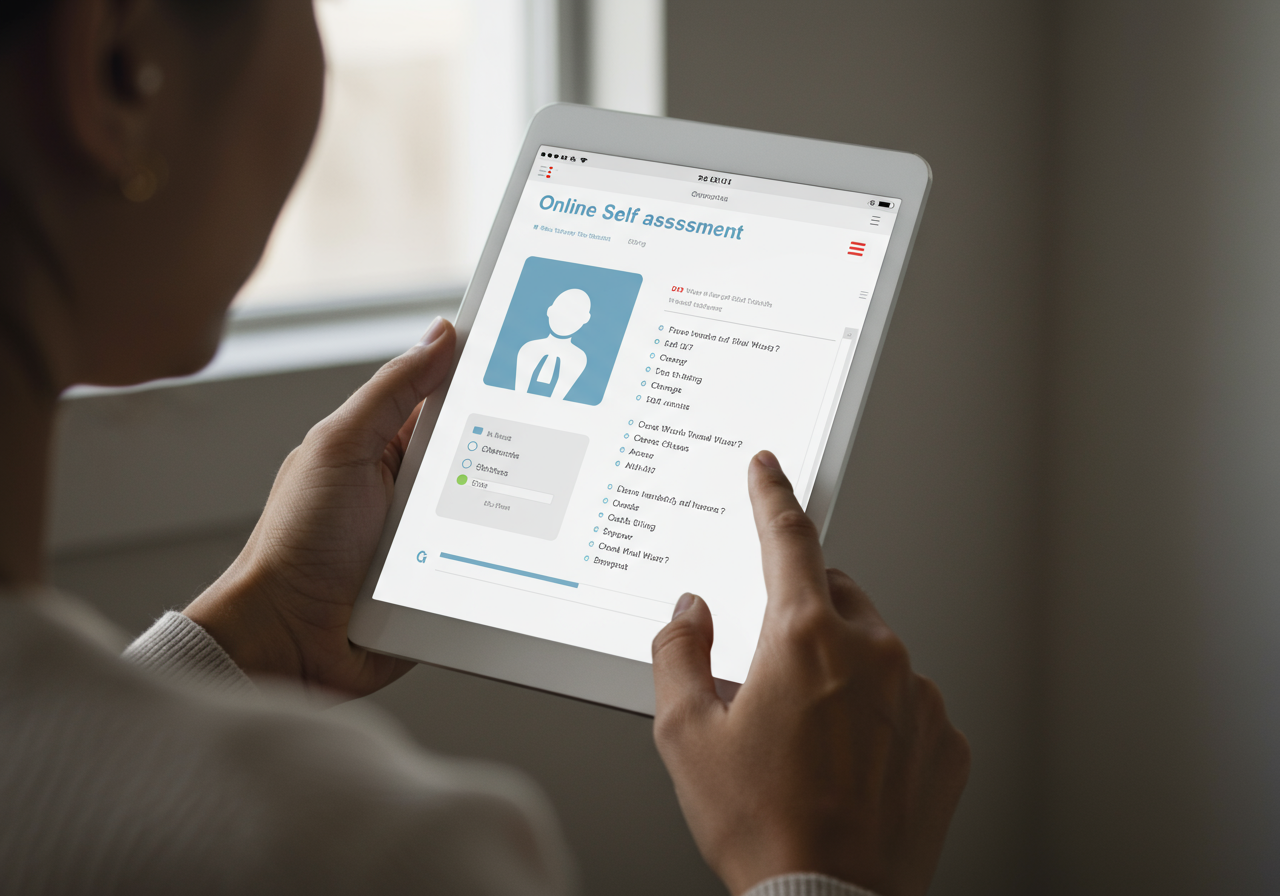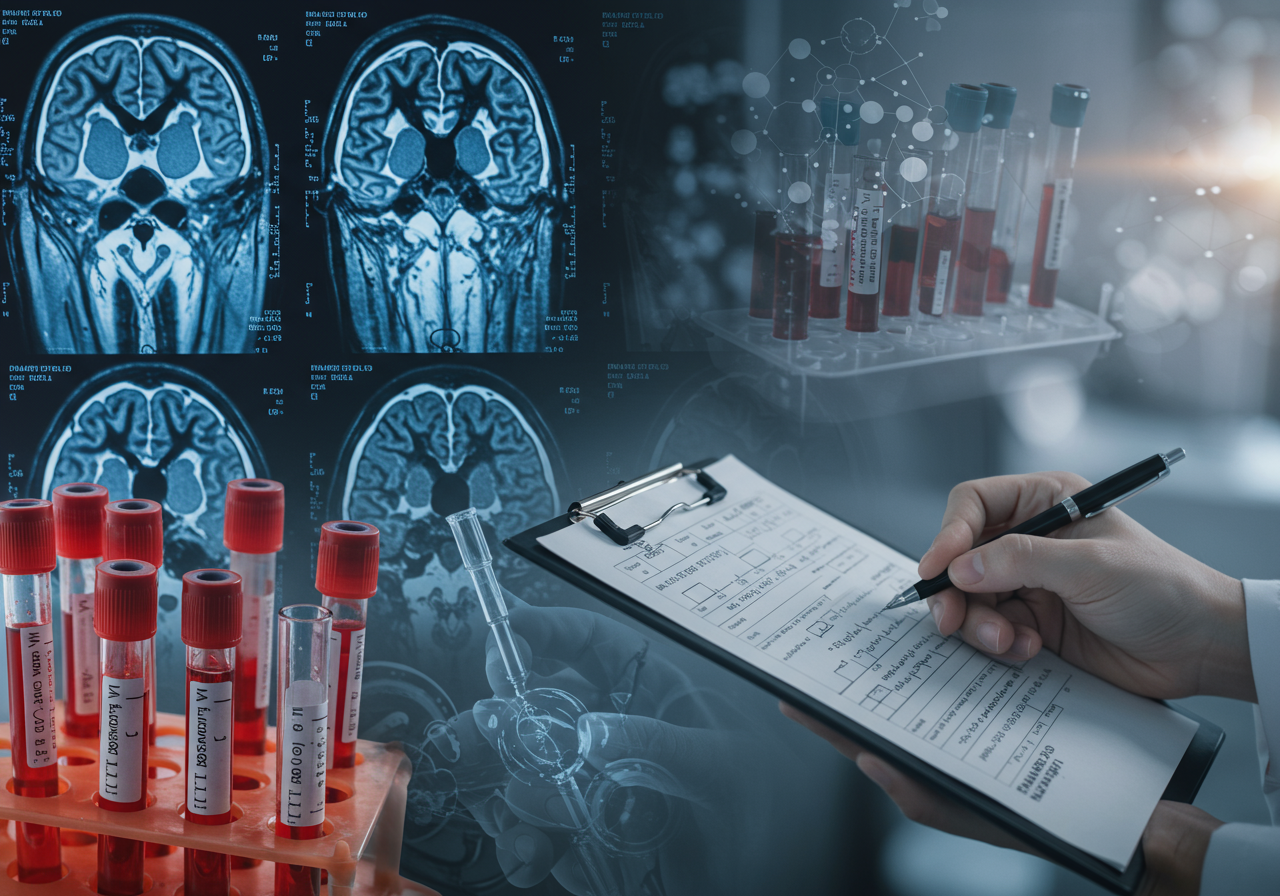การทดสอบและวินิจฉัยโรคจิตเภท: มีการทดสอบใดบ้างที่ยืนยันโรคนี้ได้?
คุณกังวลเกี่ยวกับอาการของโรคจิตเภทที่อาจเกิดขึ้นกับตัวคุณเองหรือคนที่คุณรักหรือไม่? นี่เป็นเรื่องหนักใจ และเป็นเรื่องธรรมชาติที่จะมองหา การทดสอบวินิจฉัยโรคจิตเภท ที่ตรงไปตรงมา โดยหวังว่าจะได้คำตอบที่รวดเร็วและชัดเจน แต่มีการทดสอบใดบ้างที่ยืนยันโรคจิตเภทได้อย่างแท้จริง? ความเป็นจริงคือ การวินิจฉัยภาวะที่ซับซ้อนนี้เป็นกระบวนการที่ละเอียดรอบคอบและครอบคลุมหลายด้าน ไม่ใช่แบบทดสอบใช่หรือไม่ใช่ที่เรียบง่าย
คู่มือนี้มีวัตถุประสงค์เพื่ออธิบายให้เข้าใจง่ายเกี่ยวกับการวินิจฉัยโดยผู้เชี่ยวชาญ เราจะสำรวจว่าทำไมการทดสอบเพียงครั้งเดียวจึงไม่ใช่คำตอบ อธิบายขั้นตอนที่แพทย์ใช้เพื่อสรุปผลที่ถูกต้อง และแสดงให้คุณเห็นถึงวิธีเริ่มต้นอย่างมีความรับผิดชอบเพื่อทำความเข้าใจประสบการณ์ของคุณ แม้ว่าการประเมินโดยผู้เชี่ยวชาญเป็นสิ่งจำเป็น แต่การได้รับข้อมูลเบื้องต้นสามารถเป็นจุดเริ่มต้นที่เสริมพลังได้ แหล่งข้อมูลที่เป็นประโยชน์ เช่น การทดสอบคัดกรองฟรี สามารถช่วยจัดระเบียบความคิดของคุณก่อนที่จะขอความช่วยเหลือ

ความเป็นจริงของการวินิจฉัยโรคจิตเภท
ก่อนที่จะเจาะลึกกระบวนการทางคลินิก สิ่งสำคัญคือการจัดการความคาดหวัง เส้นทางสู่การวินิจฉัยโรคจิตเภทไม่ใช่ขั้นตอนเดียวที่แน่นอน แต่เป็นการประเมินที่ครอบคลุมซึ่งต้องอาศัยความเชี่ยวชาญทางคลินิกในการตีความข้อมูลที่หลากหลายเกี่ยวกับชีวิตและประสบการณ์ของบุคคล แนวทางที่รอบคอบนี้ช่วยให้มั่นใจถึงความถูกต้องและหลีกเลี่ยงการวินิจฉัยคลาดเคลื่อน ซึ่งเป็นสิ่งสำคัญสำหรับการสนับสนุนระยะยาวที่มีประสิทธิภาพ
ทำไมจึงไม่มี "การตรวจเลือดสำหรับโรคจิตเภท" เพียงอย่างเดียว
หนึ่งในคำถามที่พบบ่อยที่สุดที่ผู้คนมีคือเกี่ยวกับการ ตรวจเลือดสำหรับโรคจิตเภท นี่เป็นความหวังที่เข้าใจได้ เนื่องจากการตรวจเลือดจะให้การยืนยันทางชีวภาพที่เรียบง่าย อย่างไรก็ตาม ในปัจจุบันยังไม่มีการทดสอบดังกล่าว โรคจิตเภทเป็นความผิดปกติของการทำงานของสมอง ความคิด และการรับรู้ ต้นกำเนิดของโรคนี้ไม่พบในตัวบ่งชี้ในเลือด เช่น ไวรัส หรือการขาดวิตามิน
ในขณะที่นักวิจัยกำลังสำรวจตัวบ่งชี้ทางชีวภาพและลิงก์ทางพันธุกรรมที่อาจเป็นไปได้ แต่สิ่งเหล่านี้ยังคงอยู่ในขั้นตอนการทดลอง "การทดสอบในห้องปฏิบัติการ" ที่แพทย์อาจสั่งนั้นมีวัตถุประสงค์ที่แตกต่างกัน แต่สำคัญไม่แพ้กัน นั่นคือ เพื่อแยกแยะภาวะทางการแพทย์อื่น ๆ ที่อาจทำให้เกิดอาการที่แสดงออกคล้ายโรคจิต กระบวนการกำจัดนี้เป็นส่วนสำคัญของปริศนาการวินิจฉัย

ทำความเข้าใจ "วิธีการทดสอบโรคจิตเภท" อย่างมืออาชีพ
ดังนั้น หากไม่มีการทดสอบในห้องปฏิบัติการที่เรียบง่าย แล้ว วิธีการทดสอบโรคจิตเภท ในทางคลินิกคืออะไร? คำตอบคือการประเมินอย่างละเอียดโดยผู้เชี่ยวชาญด้านสุขภาพจิตที่มีคุณสมบัติ เช่น จิตแพทย์ หรือนักจิตวิทยาคลินิก การประเมินนี้เป็นมากกว่ารายการตรวจสอบอาการ แต่เป็นการสำรวจเชิงลึกของประสบการณ์ส่วนตัว พฤติกรรมที่สังเกตได้ ประวัติส่วนตัว และการทำงานโดยรวมของบุคคล
การทดสอบโรคจิตเภทออนไลน์ สามารถเป็นขั้นตอนแรกที่มีประโยชน์ ช่วยให้คุณระบุและอธิบายประสบการณ์ที่น่ากังวลได้อย่างเป็นระบบ ลองคิดว่าเป็นแนวทางในการเตรียมตัวสำหรับการพูดคุยที่ตรงประเด็นกับแพทย์ ผลลัพธ์จากการ ประเมินตนเองอย่างเป็นความลับ สามารถให้สรุปอาการส่วนตัวที่คุณสามารถแบ่งปันกับผู้ให้บริการด้านสุขภาพเพื่อเริ่มต้นการประเมินโดยผู้เชี่ยวชาญได้
กระบวนการวินิจฉัยทางคลินิก: ขั้นตอนสำคัญ
การวินิจฉัยอย่างเป็นทางการเป็นกระบวนการที่เป็นระบบ แพทย์จะรวบรวมหลักฐานจากหลายแหล่งเพื่อสร้างภาพรวมที่สมบูรณ์ของสุขภาพจิตของบุคคล ซึ่งช่วยให้มั่นใจว่าการวินิจฉัยเชื่อถือได้และเป็นพื้นฐานสำหรับแผนการรักษาที่มีประสิทธิภาพ
การประเมินทางจิตเวชและเกณฑ์อาการ (DSM-5)
รากฐานสำคัญของการวินิจฉัยคือ การประเมินทางจิตเวช ที่ครอบคลุม ในระหว่างกระบวนการนี้ แพทย์จะทำการสัมภาษณ์อย่างละเอียดเพื่อทำความเข้าใจความคิด ความรู้สึก และประสบการณ์ของคุณ พวกเขาจะถามเกี่ยวกับอาการเฉพาะ เช่น ประสาทหลอน (การเห็นหรือได้ยินสิ่งที่ผู้อื่นไม่ได้เห็นหรือได้ยิน) อาการหลงผิด (ความเชื่อที่รุนแรงและผิดพลาด) ความคิดที่สับสน และอาการด้านลบ เช่น การถอนตัวจากสังคม หรือการขาดแรงจูงใจ
ผู้เชี่ยวชาญใช้เกณฑ์จาก คู่มือการวินิจฉัยและสถิติสำหรับความผิดปกติทางจิต ฉบับที่ 5 (DSM-5) เพื่อเป็นแนวทางในการประเมิน คู่มือนี้ให้เกณฑ์มาตรฐานสำหรับการวินิจฉัยภาวะสุขภาพจิต เพื่อให้มั่นใจถึงความสอดคล้องและความถูกต้อง สำหรับการวินิจฉัยโรคจิตเภท DSM-5 กำหนดให้บุคคลต้องมีอาการหลักอย่างน้อยสองอาการเป็นระยะเวลานานกว่าหนึ่งเดือน โดยมีสัญญาณของความผิดปกติอย่างต่อเนื่องเป็นเวลาอย่างน้อยหกเดือน ซึ่งนำไปสู่ความสามารถในการทำงานที่ลดลง

การสังเกต ประวัติทางการแพทย์ และข้อมูลจากบุคคลที่สาม
การวินิจฉัยไม่ได้ขึ้นอยู่กับอาการที่รายงานด้วยตนเองเท่านั้น แพทย์จะพิจารณา ประวัติทางการแพทย์ ของบุคคลด้วย รวมถึงปัญหาทางกายหรือสุขภาพจิตในอดีต ประวัติครอบครัวของโรคทางจิต และยาที่ใช้อยู่ในปัจจุบัน สิ่งนี้ช่วยในการแยกแยะสาเหตุอื่น ๆ ที่อาจทำให้เกิดอาการที่กำลังประสบอยู่
การสังเกตพฤติกรรม รูปแบบการพูด และการแสดงออกทางอารมณ์ของบุคคลในระหว่างการประเมินยังให้ข้อบ่งชี้ที่สำคัญ ในหลายกรณี โดยเฉพาะอย่างยิ่งกับการ ทดสอบโรคจิตเภทในวัยรุ่น แพทย์อาจขออนุญาตพูดคุยกับสมาชิกในครอบครัวหรือเพื่อนสนิท "ข้อมูลจากบุคคลที่สาม" นี้สามารถให้มุมมองเพิ่มเติมเกี่ยวกับการเปลี่ยนแปลงพฤติกรรมและการทำงานเมื่อเวลาผ่านไป ซึ่งบุคคลนั้นอาจไม่รับรู้หรือไม่สามารถอธิบายได้อย่างชัดเจน
การแยกแยะภาวะอื่น ๆ: การวินิจฉัยแยกโรค
ส่วนสำคัญอย่างยิ่งของการ ทดสอบประเมินโรคจิตเภท คือการวินิจฉัยแยกโรค นี่คือกระบวนการทางคลินิกในการแยกแยะความผิดปกติหนึ่งออกจากความผิดปกติอื่น ๆ ที่มีอาการคล้ายคลึงกัน ภาวะทางการแพทย์และจิตใจหลายอย่างสามารถแสดงอาการคล้ายคลึงกับสัญญาณของโรคจิตเภทได้ ทำให้ขั้นตอนนี้มีความสำคัญอย่างยิ่งต่อการวินิจฉัยที่ถูกต้อง
การตรวจร่างกาย การทดสอบในห้องปฏิบัติการ และการคัดกรองยาเสพติด
นี่คือส่วนที่ การตรวจร่างกายและการทดสอบในห้องปฏิบัติการ มีบทบาท แพทย์มักจะทำการตรวจร่างกายและสั่งการตรวจเลือด หรือแม้แต่การถ่ายภาพสมอง (เช่น MRI หรือ CT scan) เป้าหมายในที่นี้ไม่ใช่การค้นหาโรคจิตเภท แต่เพื่อตัดสาเหตุอื่นออก การทดสอบเหล่านี้สามารถระบุภาวะต่างๆ เช่น เนื้องอกในสมอง ความผิดปกติของต่อมไทรอยด์ โรคภูมิต้านตนเอง หรือการติดเชื้อที่อาจทำให้เกิดอาการทางจิต
การคัดกรองยาเสพติดและแอลกอฮอล์ก็เป็นขั้นตอนมาตรฐาน การใช้สารเสพติด รวมถึงกัญชา แอมเฟตามีน และสารหลอนประสาท สามารถกระตุ้นให้เกิดอาการทางจิตที่ดูคล้ายกับโรคจิตเภทได้ สิ่งสำคัญคือการพิจารณาว่าอาการเป็นผลมาจากการใช้สารเสพติดหรือความผิดปกติทางจิตที่ซ่อนอยู่

การแยกแยะโรคจิตเภทจากปัญหาสุขภาพจิตที่คล้ายคลึงกัน
ความผิดปกติทางสุขภาพจิตอื่น ๆ อีกหลายอย่างมีอาการที่ทับซ้อนกับโรคจิตเภท ตัวอย่างเช่น ผู้ที่กำลังมองหา การทดสอบเพื่อวินิจฉัยโรคไบโพลาร์หรือโรคจิตเภท อาจมีอาการทางจิต ซึ่งสามารถเกิดขึ้นได้ในทั้งสองภาวะ อย่างไรก็ตาม ในโรคไบโพลาร์ อาการทางจิตมักจะปรากฏขึ้นในระหว่างภาวะคลั่งหรือภาวะซึมเศร้ารุนแรง
แพทย์ต้องแยกแยะโรคจิตเภทออกจากโรคจิตเภทอารมณ์สองขั้ว (ซึ่งรวมถึงภาวะอารมณ์แปรปรวน) ภาวะซึมเศร้ารุนแรงที่มีอาการทางจิต โรคหลงผิด และความผิดปกติทางบุคลิกภาพบางอย่างอย่างรอบคอบ สิ่งนี้ต้องอาศัยความเข้าใจอย่างลึกซึ้งในความละเอียดอ่อนของแต่ละภาวะ และการประเมินอย่างรอบคอบเกี่ยวกับรูปแบบอาการและการทำงานในระยะยาวของบุคคล การทำ แบบทดสอบโรคจิตเภท เบื้องต้นสามารถช่วยจัดหมวดหมู่รูปแบบเหล่านี้เพื่อการพูดคุยที่ชัดเจนยิ่งขึ้นกับผู้เชี่ยวชาญ
ขั้นตอนต่อไปของคุณเพื่อความชัดเจนและการสนับสนุน
การทำความเข้าใจว่าการวินิจฉัยโรคจิตเภทเป็นกระบวนการทางวิชาชีพที่ครอบคลุมเป็นประเด็นสำคัญที่สุด ไม่มี การทดสอบวินิจฉัยโรคจิตเภท ที่ให้ผลทันที และการวินิจฉัยตนเองอาจนำไปสู่ความกลัวและความสับสนที่ไม่จำเป็น การเดินทางสู่ความชัดเจนเริ่มต้นด้วยการยอมรับความกังวลของคุณและดำเนินการอย่างมีข้อมูลและมีความรับผิดชอบ
แม้ว่าจะมีเพียงแพทย์ผู้เชี่ยวชาญเท่านั้นที่สามารถให้การวินิจฉัยได้ แต่คุณก็สามารถมีส่วนร่วมได้ การใช้เครื่องมือออนไลน์ที่เป็นความลับและฟรีสามารถเป็นก้าวแรกที่มีคุณค่า ช่วยให้คุณสำรวจอาการของคุณเป็นการส่วนตัว ได้รับข้อมูลเชิงลึกเบื้องต้น และรู้สึกพร้อมมากขึ้นที่จะพูดคุยกับแพทย์ การไตร่ตรองตนเองนี้สามารถเปลี่ยนความวิตกกังวลให้เป็นการลงมือทำได้ หากคุณพร้อมที่จะก้าวแรก คุณสามารถ เริ่มการประเมินของคุณ ได้เลย
คำถามที่พบบ่อยเกี่ยวกับการวินิจฉัยโรคจิตเภท
แพทย์วินิจฉัยโรคจิตเภทได้อย่างไร? แพทย์ ซึ่งโดยทั่วไปคือจิตแพทย์ จะวินิจฉัยโรคจิตเภทผ่านการประเมินทางจิตเวชที่ครอบคลุม ซึ่งรวมถึงการสัมภาษณ์โดยละเอียดเกี่ยวกับอาการ การทบทวนประวัติทางการแพทย์และประวัติครอบครัว การสังเกตพฤติกรรม และการแยกแยะสาเหตุทางการแพทย์หรือที่เกี่ยวข้องกับสารเสพติดอื่น ๆ พวกเขาใช้เกณฑ์จาก DSM-5 เพื่อวินิจฉัยอย่างเป็นทางการ
การทดสอบชนิดใดที่ยืนยันการวินิจฉัยโรคจิตเภท? ไม่มีการทดสอบใดเพียงอย่างเดียวที่ยืนยันโรคจิตเภทได้ แต่เป็นการอาศัยวิธีการต่าง ๆ ร่วมกันที่ยืนยันการวินิจฉัย ซึ่งรวมถึงการสัมภาษณ์ทางคลินิกเพื่อประเมินอาการ เช่น ประสาทหลอนและอาการหลงผิด การประเมินทางจิตวิทยา และการทดสอบทางการแพทย์ (เช่น การตรวจเลือดและการถ่ายภาพสมอง) เพื่อแยกแยะภาวะอื่น ๆ ที่อาจเป็นสาเหตุของอาการ
มีการตรวจเลือดเพื่อวินิจฉัยโรคจิตเภทได้หรือไม่? ไม่ ในปัจจุบันยังไม่มีการตรวจเลือดใดที่สามารถวินิจฉัยโรคจิตเภทได้ ในขณะที่นักวิจัยกำลังศึกษาตัวบ่งชี้ทางพันธุกรรมและชีวภาพ การวินิจฉัยในปัจจุบันขึ้นอยู่กับการประเมินอาการทางคลินิกและประวัติของบุคคล ไม่ใช่ผลการทดสอบในห้องปฏิบัติการ
ฉันจะแยกได้อย่างไรว่าฉันเป็นโรคจิตเภทหรือแค่กังวล? เป็นไปไม่ได้ที่จะวินิจฉัยโรคจิตเภทด้วยตนเอง ความกังวลและความวิตกกังวลบางครั้งอาจแสดงออกอย่างรุนแรง หากความคิดหรือประสบการณ์ของคุณทำให้คุณมีความไม่สบายใจอย่างรุนแรงหรือรบกวนชีวิตประจำวันของคุณ การดำเนินการที่ดีที่สุดคือการขอความช่วยเหลือจากผู้เชี่ยวชาญ จุดเริ่มต้นที่ดีคือการใช้ แบบทดสอบสัญญาณเริ่มต้นของโรคจิตเภท ที่เป็นความลับเพื่อช่วยให้คุณเรียบเรียงความกังวลของคุณก่อนที่จะปรึกษาผู้ให้บริการด้านสุขภาพ
คำสงวนสิทธิ์: เว็บไซต์นี้มีเครื่องมือประเมินตนเองเบื้องต้นและไม่ใช่สิ่งทดแทนคำแนะนำทางการแพทย์ การวินิจฉัย หรือการรักษาโดยผู้เชี่ยวชาญ หากคุณมีข้อกังวลเกี่ยวกับสุขภาพจิตของคุณ โปรดปรึกษาผู้เชี่ยวชาญด้านสุขภาพที่มีคุณสมบัติเหมาะสม